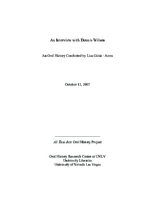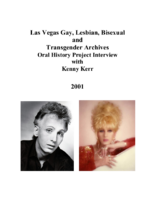Search the Special Collections and Archives Portal
Search Results

Interview with Ann G. Dye, November 1, 2004
Date
Archival Collection
Description
Text

Chet Buchanan oral history interview: transcript
Date
Archival Collection
Description
Oral history interview with Chet Buchanan conducted by Barbara Tabach on November 28, 2017 for the Remembering 1 October Oral History Project. Chet Buchanan begins this interview with a discussion of his move to Las Vegas, Nevada in 1999 after he was offered a job as a radio show host for 98.5 KLUC. He talks about the specifics of his job, including his career background as well as the Chet Buchanan Toy Drive. For this interview, he specifically goes into detail on his coverage of the Las Vegas October 2017 mass shooting and discusses being in San Diego, California at the time, yet still striving to reach people through his broadcast with the help of CBS San Diego. Throughout the interview, Buchanan examines his desire to make a difference in the community with his show and his interactions with the public.
Text

Transcript of interview with Dennis Wilson by Lisa Gioia-Acres, October 12, 2010
Date
Description
Dennis Wilson an experienced musician was born in Arabi, Louisiana in 1951. His parents both served in the Marine Corps. Dennis started playing the clarinet in the 4th grade but he did not stop there by the time he was in college he could play the alto saxophone, flute, and clarinet. He received a scholarship to Loyola University in New Orleans. The first introduction to Las Vegas was in 1971. At this time Dennis played for Wayne Cochran and the C.C. Riders traveling all around the United States with the band. In 1979 Dennis moved back to Las Vegas after a short stay in New Orleans. On his return to Las Vegas Dennis recalls his experiences playing with relief bands and performing weekly at Stardust, Dunes, Flamingo, Tropicana, Sands and Caesars. Dennis recalls what it was like working in Las Vegas and the rigorous schedule of a musician. Dennis has had a successful carrier as a musician he went on to play for Burt Bacharach and Dionne Warwick traveling the world. He then settled back in Vegas working on prominent shows such as Avenue Q, Spamalot, and Phantom of the Opera. Dennis still resides in Las Vegas and is now a paraprofessional at Johnson Junior High.
Text

Transcript of interview with Mahamed Youssouf by Barbara Tabach, August 6, 2013 & August 13, 2013
Date
Archival Collection
Description
Ethiopian business owner Mahamed Youssouf became an American citizen in 1986. Born in Harar, Ethiopia, he recalls the hardships he had to endure during the Ethiopia-Somalia conflict. Coming from a family of tailors, he began making clothes with his father at a very early age. Mahamed’s recollections concerning his journey from political refugee to successful businessman demonstrates his resilience and determination to overcome obstacles and achieve his goals. Mahamed moved to Las Vegas, Nevada in 1985, where he rented a storefront in North Las Vegas. The name of his store was Uniform Plus and he focused mainly on making children’s clothes. His efforts proved lucrative as he began buying wholesale in Los Angeles, California, and selling clothes in Las Vegas on the weekends at the outdoor Swap Meet. After a fateful encounter, Mahamed became business partners with Eugene Hoffman, owner of Village East Cleaners. Mahamed firmly believes that communication is the key to socio-economic success. He views education as an investment and states that, “to have dialogue means better relationships.” When the Ethiopian government was overthrown, Mahamed returned home to Africa for a visit. He met his wife while there, got married, and started a family. Mahamed returned to America and bought a family home in Las Vegas. He dedicated his time to teaching his American born children more about Ethiopian culture and taught himself more about American culture— including the African-American experience in Las Vegas, racism, the Moulin Rouge, and the Westside.
Text

Transcript of interview with Willie Jones, James Jones, and Jamet Jones by Robbin Mc Laurin, March 5, 1980
Date
Archival Collection
Description
On March 5, 1980, collector Robbin McLaurin interviews three members of the Jones family, Willie, James, and Jamet Jones (born 1923, 1920, and 1961, respectively) in the Jones home. Mr. and Mrs. Jones were born in Forest, Mississippi, and relocated to Las Vegas, Nevada, for employment related purposes. This interview covers Las Vegas, past and present.
Text

Transcript of interview with Daniel Kaminski by Brian Corcoran, March 14, 1978
Date
Archival Collection
Description
On March 14, 1978, Brian Corcoran interviewed Twenty-One dealer Daniel Kaminski (born November 17th, 1947 in New Jersey) about his life in Southern Nevada. The two discuss Kaminski’s occupational history and gambling practices amongst tourists. They then go in depth on the rise of gambling establishments across the United States and the impacts it may have on Las Vegas. The interview concludes with a discussion on the role of dealers in casinos.
Text

Transcript of interview with Kenny Kerr by Dennis McBride, May 29 & 30, 2001
Date
Archival Collection
Description
In the years following this interview, Kerr continued entertaining, although he never returned to the Las Vegas Strip. Kerr performed at OUTfest Phoenix, at Palm Springs’ Awesome August celebrations, Las Vegas’ National Coming Out Day event, and for the Gay and Lesbian Community Center’s Youth Service’s Division. Kerr also gave shows at small bars and restaurants such as Café Nicolle and DeStefano’s in Las Vegas, the Wilde Goose in Cathedral City, California, and the Plush Room in San Francisco. There were rumors that Kerr was set to replace emcee Joey Arias in Cirque du Soliel [2004] and Frank Marino in La Cage [2005], but neither turned out to be true. Instead, Kerr performed in such local gay nightclubs as Flex, Sasha’s, Krave, Suede, and, on July 31, 2012, at the Onyx Theatre in Commercial Center. In 2006, Kerr made peace with his former rival, Frank Marino. Kerr’s son, Kristin Vidal, made Kenny a grandfather with his own son, Alexander. It was clear during his July 2012 performan
Text

Transcript of interview with Judy Laliberte by LaVaun Hendrix, February 27, 1979
Date
Archival Collection
Description
On February 27, 1979, collector Judy Laliberte interviewed local school teacher LaVaun Hendrix in her home in Las Vegas, Nevada. The two discuss how Hendrix originally came to Nevada, her occupational history, and differences between the school system in Las Vegas and other states that she’s lived in. Hendrix explains how a changing school system has affected her job as a teacher and her students. She goes on to talk about the above-ground atomic tests, Helldorado, changes to the desert, and Nevada during World War II. The interview concludes with Hendrix describing her travels through Nevada.
Text

Transcript of interview with Elinor Horden by Valerie Fujii, February 13, 1930
Date
Archival Collection
Description
On February 13th, 1980, collector Valerie Fujii interviewed dancer, Elinor Horden, (born May 21st, 1930 in Ohio) at the University of Nevada, Las Vegas. This interview covers local entertainment in the 1950s and the social and environmental changes that have occurred in Las Vegas, Nevada.
Text

Transcript of interview with David Straus and Heidi Straus by Barbara Tabach, November 6, 2015
Date
Archival Collection
Description
In this interview, the Straus? discuss the joys of growing up in Las Vegas during the 1960s and 1970s, and the changes within the community over time, especially in educational opportunities. Both talk about Joyce Straus? career as artist and art educator, and the influence she had on their lives. They also remember Heidi?s father, Jay Sarno, and the impact he had on the local gaming industry. There is also discussion of the founding of Congregation Ner Tamid, the role of Jewish women?s philanthropy within the community, as well as the establishment of The Meadows School.
Text
